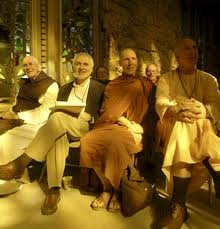Interspirituality
 It’s kind of funny, when it comes right down to it, but religion is the exception to the rule that says if you want to learn more about a subject it’s best to gather as much information from as many different sources as you can. Religion, as opposed to spirituality, in direct opposition to that rule, says that if you want to learn about God you should only investigate the opinions of those who believe the same way that we do. It’s the only field of inquiry that self limits its own inquiry, and the only field of inquiry that appears to be afraid of what it might discover. I wonder if that seems odd to anyone besides me.
It’s kind of funny, when it comes right down to it, but religion is the exception to the rule that says if you want to learn more about a subject it’s best to gather as much information from as many different sources as you can. Religion, as opposed to spirituality, in direct opposition to that rule, says that if you want to learn about God you should only investigate the opinions of those who believe the same way that we do. It’s the only field of inquiry that self limits its own inquiry, and the only field of inquiry that appears to be afraid of what it might discover. I wonder if that seems odd to anyone besides me.
You would think that if a person really loved God then they would want to know everything they could about God – much as we want to know everything we can know about the human beings we love. We want to understand our beloved God at least as much or as well as we do the humans we love. Much as we do when we are learning how to exist in loving relationship with other human beings, we may well develop friends with whom we can discuss our relationship with God in hopes of better understanding both God and relationship. Religion has taught us, however, that we should only have these discussions with people from inside our tradition. That seems kind of odd, because the people we are directed to by religion are essentially in our religious family, and were we to have a discussion about our human relationships we would most likely choose our confidant from outside our biological family because they afford us the benefit of a different perspective and are also less likely to run to our parents and spill the beans about who we have been sleeping with.
Religion doesn’t like interspirituality, but spirituality isn’t nearly as territorial as religion. Religions compete with one another, while  spiritualities coexist with one another. Interspirituality – even syncretism, despised by religion – affords us the opportunity to come to a more complete, if still by definition limited, understanding of God and the universe in which we live, move, and have our being. There is absolutely nothing wrong with that, and a whole lot that is right about it. Religion has proven time and again that religion is a jealous god and so has tried to convince us that God is jealous as well. That’s a classic example of Freudian projection.
spiritualities coexist with one another. Interspirituality – even syncretism, despised by religion – affords us the opportunity to come to a more complete, if still by definition limited, understanding of God and the universe in which we live, move, and have our being. There is absolutely nothing wrong with that, and a whole lot that is right about it. Religion has proven time and again that religion is a jealous god and so has tried to convince us that God is jealous as well. That’s a classic example of Freudian projection.
I truly believe that by the mid-point of this century religion will be all but dead, having been replaced by spiritualites that allow us to engage in spiritual practices that help us draw closer to God in an individualized, custom tailored way. I also believe that most if not all of the people who struggle to come to grips with God are actually struggling not with God but with those who claim to speak on behalf of God. What’s the difference? Well, aside from the obvious difference that human beings are not God, religion speaks largely from its own self-interest. Religion speaks to draw us into religion, thereby allowing religion to survive. If it needs to bend the truth a bit to get us in the door, it will – because it believes itself to be God’s only spokesperson.
Of course, spiritualities can be misguided just as easily as religion. We have to be selective about which spiritual teachers we listen to and we need to be discerning about the teachings we hear. That having been said, spirituality has the potential to come from a place where it doesn’t need to sustain itself. Once we have experienced the freedom to follow a path that walks in open dialogue with others, if our path turns out to be a dead-end we may be sad but we also will be comforted in the knowledge there are many other paths containing the truth. We are on the edge of great discoveries, great learning, great spirituality, and great growth. All it requires is the courage to step out of the comfortable but nevertheless restricting systems of religion and take responsibility for our own spiritual lives.

